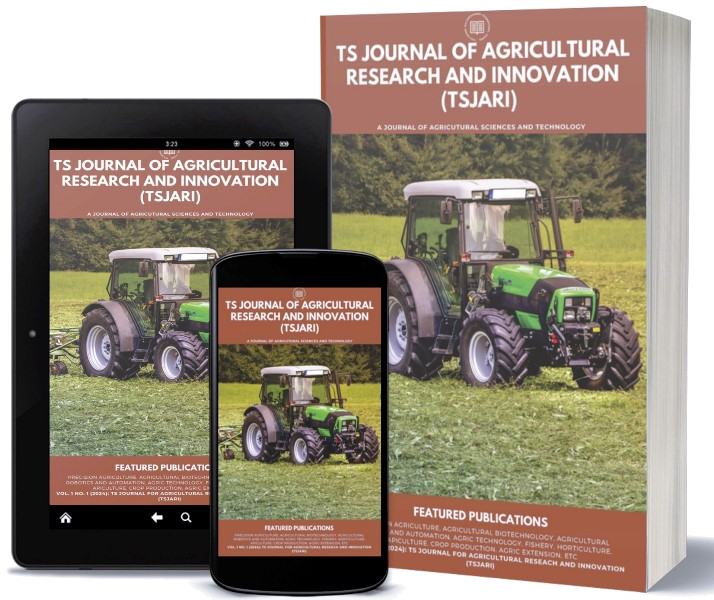Conflict Assessment Between Fulani herdsmen and Crop Farmers: Impact on Water and Food Security
Conflict Assessment Between Fulani herdsmen and Crop Farmers: Impact on Water and Food Security
DOI:
https://doi.org/10.5281/zenodo.13985452Abstract
This review examines the complex relationships between water resources, agriculture, and conflict in Nigeria, highlighting the impacts of Fulani-herder and farmer disputes on sustainable water management and food security. While the crop farmers accused the herdsmen of destroying their crops and contaminating community waters, the herdsmen accused the crop farmers of denying them access to grazing lands which they need for grazing their cattle. The cause for concern is the invasion of farm areas by armed bandits under the guise of herdsmen, leading to the destruction of rural areas, displacement of rural farmers and the villagers resulting in insecurity and violence. The intensity of the menace is higher in Plateau, Benue, Nassarawa, Southern Kaduna, Zamfara and Taraba States. The menace is also felt in the Southwest with minimum security threats and loss of lives as compared to the North Central zones. The attendant consequences of these clashes are better imagined than described in communities where they occurred. This paper identifies remote and immediate causes of the clashes and provides recommendations and solutions that can be employed to end the clashes or reduce it to a bearable minimum. The paper argues that Fulani herdsmen have in several ways infringed on the privacy of the crop farmers leading to loss of lives and reduction in valuable food produced in these farms leading to increase in food prices as a result of scarcity. By implementing the proposed recommendations, Nigeria can work towards sustainable conflict resolution, ensuring the preservation of inland waters and the promotion of food security for all its citizens. Access to land is a major cause of conflicts. There is the need for the government to review the existing laws as it relates to accessibility to land by members of community. Government should ensure that there is equity and accessibility to arable and grazing land to avert constant conflict. There is need to create awareness on the difference between pasture and crop farm. Therefore, a peaceful coexistence between the crop farmers and Fulani herdsmen in order to create a greater lasting peace between the Fulani herdsmen and crop farmers who had hitherto lived in harmony and co-existed for many decades was emphasized.
References
Abdullahi, A. (2018). Examining the Fulani Herdsmen and Farmers Conflict in Nigeria. Journal of Conflict and Security Studies, 3(2), 1-14.
Adegbola, A. (2020). The Fulani Herdsmen Crisis and Food Security in Nigeria. Journal of Sustainable Agriculture, 4(2), 45-61.
Adeyemo, O. A., & Adetunji, M. T. (2019). Soil fertility management practices for sustainable aquaculture production in Nigeria. International Journal of
Fisheries and Aquaculture, 11(2), 15-28.
Adibe, R., Akoro, S., & Adeleke, B. (2020). Conflict and food security in Nigeria: A review. Journal of Food Security, 8(2), 1-12.
Adeleke, B., Adibe, R., & Akoro, S. (2019). Land conflict and agricultural productivity in Nigeria. Journal of Agricultural Economics, 20(1), 1-15.
Adibe, R., Akoro, S., & Adeleke, B. (2020). Conflict and food security in Nigeria: A review. Journal of Food Security, 8(2), 1-12.
Akintunde, E. A., Adekunle, V. A., & Okunlola, A. A. (2017). Effect of soil erosion on water quality and fish production in Nigeria. Journal of Agricultural
Sciences, 12(1), 64-77.
Akoro, S., Adeleke, B., & Adibe, R. (2020). Water pollution and conflict in Nigeria: A review. Journal of Environmental Studies, 40(1), 1-18.
Akungwa, P. (2020). Fulani herdsmen and crop farmers conflict in Nigeria: Causes and consequences. Journal of Conflict Studies, 10(1), 1-12.
Alabi, O. J., & Adewole, M. B. (2018). Soil management practices and their effects on sustainable aquaculture production in South West Nigeria. Journal of
Sustainable Agriculture and Environment, 15(2), 45-56.
Awoyemi, O. O., & Adebayo, A. A. (2021). Impact of nutrient management on water productivity in aquaculture systems in South West Nigeria. Aquaculture
Research, 52(7), 2678-2690.
Bamidele, S. (2019). Food security and conflict in Nigeria: A review. Journal of Food Security, 7(1), 1-10.
Balogun, J. K., & Ogunbode, T. F. (2019). Soil erosion control measures for sustainable aquaculture production in Nigeria. Journal of Soil and Water
Conservation, 24(3), 89-102.
FAO (1985). Grazing reserves and development blocks: A case study from Nigeria Development Requirements.
http://www.fao.org/wairdocs/ilri/x5539e/x5539e09.htm. Accessed 25 February 2015.
FAO (2011). Pastoralism and Rangeland Management. www.fao.org/docrep/014/i1861e/i1861e10.pdf. Accessed 12 March 2015.
Eze, E. (2019). Understanding the Conflict between Fulani Herdsmen and Crop Farmers in Nigeria. African Journal of Conflict Resolution, 2(1), 78-92.
Ejere, O. (2020). Sustainable agriculture and conflict resolution in Nigeria. Journal of Sustainable Agriculture, 40(1), 1-15.
Ibrahim, A. (2017). The Socio-economic Implications of the Fulani Herdsmen and Farmers Conflict in Nigeria. Journal of Agricultural Economics, 6(3), 112
Ige, D. V., & Olatunji, O. A. (2020). Enhancing water productivity in aquaculture through soil fertility management in South West Nigeria. International
Journal of Agriculture and Rural Development, 23(1), 34-48.
Ikelegbe, A. (2019). Governance and conflict resolution in Nigeria. Journal of Governance and Development, 15(1), 1-12.
International Crisis Group (2020). Nigeria: Ending the Herder-Farmer Conflict, Beyond the Headlines
Johnson, O. (2018). Land Use Conflicts between Fulani Herdsmen and Crop Farmers in Nigeria: A Review. International Journal of Conflict Management,
(4), 89-105.
Majekodunmi, A. O., et al. (2019). Mapping the spread of livestock diseases in Africa. Veterinary Research, 50(1), 1-13.
Obasi, P. (2020). Environmental sustainability and conflict in Nigeria. Journal of Environmental Sustainability, 10(1), 1-18.
Ogunbodede, A. (2021). Impacts of the Fulani Herdsmen and Crop Farmers Conflict on Inland Waters in Nigeria. Environmental Management, 10(2), 245 263.
Ojo, O. M., & Adeniyi, A. A. (2022). Effect of different soil management systems on water productivity in sustainable aquaculture production. Aquatic
Ecosystem Health & Management, 25(1), 45-57.
Olatunde, G. O., & Adewoyin, M. O. (2017). Soil erosion control measures and their impact on aquaculture production in Nigeria: a review. Nigerian Journal
of Soil Science, 27(1), 34-47.
Olujimi, O. J., & Adesanya, O. I. (2021). Soil productivity classification and its implications for aquaculture production in South West Nigeria. Journal of Agricultural Extension and Rural Development, 18(2), 56-69.
Osunade, J. A., & Adeyemo, O. A. (2022). Soil erosion and its effects on water quality and fish production in South West Nigeria. Journal of Soil and Water
Conservation, 27(2), 78-91.
Oyedeji, K. (2020). Peaceful resolution of conflict between Fulani herdsmen and crop farmers in Nigeria. Journal of Peace Studies, 20(1), 1-15.
Watson, C., et al. (2020). Pastoralism and education in Africa: A review. Journal of Arid Environments, 181, 104245
Downloads
Published
How to Cite
Issue
Section
Categories
License
Copyright (c) 2024 Tech-Sphere Journal for Agricultural Research and Innovation (TSJARI)The Journal is licensed to the Center of Research, Innovation and Development (CRID) of the Federal Polytechnic Ado-Ekiti.





